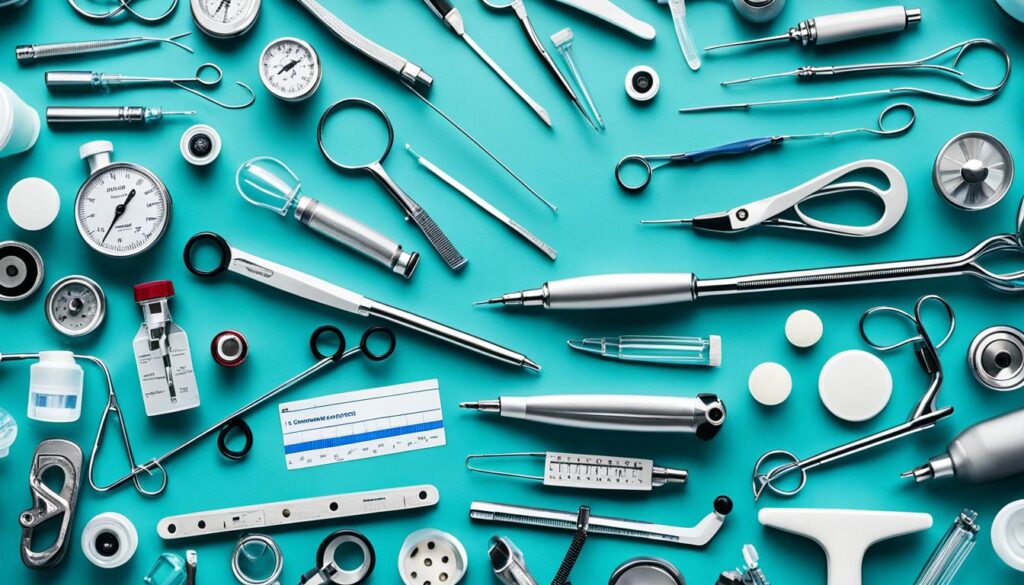Medical School: The MCAT (Medical College Admission Test) is a big test for anyone wanting to go to medical school in the U.S. It has both science and other questions. So, it’s key to study a lot and take practice MCAT exams. By doing this, students can find out what they need to study more.
The MCAT takes 7.5 hours and checks your knowledge in biology, chemistry, and more. It’s a tough test, but understanding how it works is the first step to doing well.
Key Takeaways: Medical School
- The MCAT is a crucial component of the medical school application process in the United States.
- Aspiring medical students must prepare thoroughly to excel on the MCAT, which assesses their readiness for the rigors of medical education.
- Taking MCAT practice exams helps students identify topics to focus on during their test prep.
- The MCAT is a lengthy exam that covers a wide range of subjects, including science and non-science areas.
- Understanding the purpose, structure, and scoring of the MCAT is the first step in preparing for this important exam.
Understanding the MCAT Exam
The MCAT (Medical College Admission Test) is key for getting into medical school in the US. It tests how well prospective students understand concepts and think critically. Important for aspiring doctors, MCAT scores often show if someone is ready for medical school’s challenges.
Also Read : What Are The Best Medical Services For Mental Health?
Purpose and Structure
The MCAT aims to check if medical school hopefuls have the needed knowledge for their studies. Divided into four parts, each plays a specific role in assessing readiness:
The MCAT includes sections on living systems, biological principles, and physical systems. It also covers critical thinking and how people behave. Only one section, Critical Analysis and Reasoning Skills, looks at reading skills without needing science knowledge.
Sections and Content Areas
The four sections of the MCAT are: Biological and Biochemical Foundations of Living Systems, Chemical and Physical Foundations of Biological Systems, Critical Analysis and Reasoning Skills, and Psychological, Social and Biological Foundations of Behavior. While three sections focus on natural and social sciences, the Critical Analysis and Reasoning Skills section tests reading comprehension without requiring specific background knowledge.
Also Read : What Are The Future Trends In Medical Technology?
Scoring and Percentiles
The MCAT is scored from 472 to 528. Each section’s score falls between 118 to 132. Aim for a total score of 511 or more to compete well for medical school spots. This score would put you ahead of over 80% of test-takers.
Determining MCAT Readiness
Aspiring medical students must first check their knowledge before the MCAT. They need a solid background in chemistry, biology, physics, and other science courses. If they find any gaps, they should focus on studying those areas more.
Assessing Prerequisite Knowledge
It’s crucial for future doctors to truly understand the subjects on the MCAT. They have to be ready to tackle the core science topics. If they’re weak in any area, they should study that part more.
Taking Practice Tests
It’s not enough to just evaluate your knowledge. Preparing for the MCAT also means taking practice exams. These tests show how you might do on the real thing. They also help you get used to the long test duration.
Tested your knowledge and taken practice exams? Now, premed students can create a targeted plan. This plan will make sure they are ready and confident for the MCAT.
Also Read : What Are The Best Merit Based Scholarships For High School Students?
Creating an Effective Study Plan

Creating a study plan is key to doing well on the MCAT. It means figuring out how to spend your time wisely. You need to make time for studying while also making sure you can do other things you enjoy. Using different study tools can help you see what you’re good at and what you need to work on. This lets you focus your studying where it matters most.
Also Read : What Are The Available Scholarships For Graduate Students?
Organizing Your Time
For the MCAT, being good with your time is a must. Make a schedule that sets aside study time for each part of the test. This helps you stay focused and do your best. It’s also important to take breaks. This prevents you from getting too tired and helps you stay sharp for the whole test.
Utilizing MCAT Prep Resources
There are many resources out there to help you get ready for the MCAT. You should use practice tests, books, and online materials. They let you see what you need to work on to do better. Doing practice tests over and over will make you ready for the real test. This way, you won’t get as tired during the long test day.
Building Endurance
Studying for the MCAT is like training for a long race. To get ready, you slowly work up to longer practice tests. This helps you stay focused for the 7.5 hours of the real test. By practicing like this, you can stay sharp from beginning to end.
Having a good study plan, using the right tools, and preparing your mind to stay focused help a lot. With these steps, anyone aiming to be a doctor can increase their chances of doing well on the MCAT.
Also Read : Mortgage Loan: How Does It Work?
Mastering Test-Taking Strategies
Getting good at test-taking strategies is key for a high MCAT score. Managing your time well is a must. You need to use your time smartly to finish all parts of the test. It’s helpful to answer the easier questions first, keep a steady pace, and stay focused during the whole test.
Also, knowing how to guess wisely is important. This means making educated guesses on hard questions. By learning good time management and guessing strategies, medical school hopefuls can boost their MCAT scores. They can show they’re ready for the challenge of medical school.
Time Management Techniques
Time management is essential for acing the MCAT. Techniques like pacing yourself, focusing on important questions, and staying concentrated. They help students do their best and manage their test-taking skills.
Guessing Strategies
For tough questions, educated guessing can work. Using anxiety management and your knowledge of the test material are key. They can increase your chances of getting some points on those hard questions.
Preparing for the Application Process
Getting ready for medical school is more than just doing well on the MCAT. It also involves knowing about the comprehensive set of admission requirements. These requirements include a solid academic record, relevant extracurricular activities, leadership experience, community service, and research experience.
Understanding Admission Requirements
The personal statement is a key part of the application. It lets applicants highlight what makes them special, their unique qualities, experiences, and motivations for wanting to be a doctor. Making a compelling personal statement is vital. It should show the applicant’s passion, resilience, and how they can contribute to medicine. Admissions committees often look closely at this to see if an applicant is a good fit for their school.
Crafting a Compelling Personal Statement
Dedicate time to understand the admission requirements. Then, work hard on making your personal statement shine. This can really boost your application’s strength and your chance of getting into the medical school you want. Committees look at the whole picture. They want to see a solid mix of academic achievements, extracurricular involvement, leadership experience, community service, and research experience.
Maintaining Physical and Mental Well-being
Studying for the MCAT is tough on both the mind and body. Future doctors must take care of themselves first. They should eat well and stay mentally sharp. A good, balanced diet can keep you focused for the long hours of study.
Healthy Eating Habits
Eating right is key. Fruits, veggies, whole grains, lean meats, and good fats are a must. They give you energy and the brain power needed for the MCAT. Choosing healthy foods means supporting your body and mind. It boosts your focus and brain performance.
Exercise and Stress Management
It’s not just about the food. Staying active and learning to deal with stress are vital too. Things like working out, yoga, or meditation can lower anxiety. They also build habits for taking care of yourself and keeping a good life-study balance.
Adding self-care to your study plan helps a lot. It keeps you in a great place mentally and physically. This is key for doing well on the MCAT and as a future doctor.
Medical School Selection Criteria
As you get ready for the MCAT, it’s time to think about where you want to study medicine. Look at different schools carefully. Think about what’s important to you. This will help you find the best place for your dreams.
Evaluating Programs
When you look at medical schools, check their reputation, what they teach, and the chances to do research. Getting to work with patients is also key. The way the campus feels and the help they offer matter a lot, too. These things can change your whole experience of studying and growing.
Look deeply into what each program offers, to pick a school that meets your needs. Think about how you want your studies, work, and life to be.
Considering Location and Cost
Where a school is and how much it costs are also big deals. The expenses of school and living can shape your future. Think about scholarships and aid to help out. The place of the school matters, too. It affects your daily life, what you like to do, and your job chances. Look at both the costs and the place to make a good choice.
Finding the right balance between these things helps you choose wisely. Think about your studies, money, and life goals carefully.
Financing Your Medical Education

Starting a career in medicine is a journey that needs a lot of money. Alongside preparing for the MCAT, it’s key for students to understand their financial options. This knowledge will help ease the cost of going through medical school.
Scholarships and Grants
Scholarships and grants are great support for medical school. They don’t need to be paid back. This makes them popular when looking to cover costs like tuition, fees, and living costs. Students should look for scholarships from medical schools, professional groups, and others. They can be based on grades, need, or interests in medicine.
Student Loans
If scholarships and grants aren’t enough, student loans can help. These can come from the government or private lenders. It’s crucial to pick loans that fit your future financial and career plans. This is because how you pay them back can impact your life after school.
Financial Aid Options
There are more ways to get help, including work-study and federal aid like the FAFSA. Medical schools also offer help with financial planning. It’s about creating a full budget plan. This plan will help students worry less about money and focus more on their studies.
| Financing Option | Description | Advantages | Disadvantages |
|---|---|---|---|
| Scholarships | Competitive awards based on academic merit, financial need, or specific criteria | Do not require repayment, can significantly reduce the overall cost of attendance | Highly competitive, may not cover the full cost of medical school |
| Grants | Need-based financial assistance provided by the government, universities, or private organizations | Do not require repayment, can help cover tuition, fees, and living expenses | Availability and eligibility criteria may vary |
| Federal Student Loans | Loans provided by the U.S. Department of Education, such as Direct Unsubsidized Loans and Grad PLUS Loans | Favorable interest rates, flexible repayment options, and potential for loan forgiveness programs | Accumulation of debt management can be a significant long-term financial burden |
| Private Student Loans | Loans from private lenders, such as banks or credit unions, to supplement federal aid | Can help cover remaining cost of attendance not met by other financial aid | May have higher interest rates and less favorable repayment terms than federal loans |
Medical School Life and Expectations

Getting ready for the MCAT is just the beginning for those wanting to be doctors. After getting into medical school, students face a tough curriculum that pushes them hard. This course mixes basic science classes like anatomy and physiology with actual work in medical settings.
Curriculum and Coursework
Working in actual medical settings is a big part of medical school. It helps students use what they’ve learned and learn to care for patients. As they move through medical school, they check out different areas of medicine. They also get ready for the residency matching stage, which will guide their future plans in medicine.
Clinical Rotations and Residency
It’s important to know that medical school is hard work. By understanding this, students can get ready with the right time management and study habits. This makes it easier for them to handle the challenges of becoming a doctor.
Working in different medical areas during school helps students figure out what they want to do. It guides their choices for their residency matching and career planning.
Exploring Medical Specialties

As students move ahead in their medical studies, they get to know different medical specialties. These areas provide chances to meet diverse patient needs and develop specialized skills.
Primary Care Specialties
Family medicine, internal medicine, and pediatrics are part of primary care. They look after the whole patient, aiming at keeping them healthy and catching problems early. These doctors are often the first ones patients see. They take care of many health issues and make sure their care is well-organized. Primary care doctors are very important for the health of people and communities.
Surgical Specialties
Surgical specialties are about doing procedures directly on the body. They include general surgery and more focused areas like neurosurgery or orthopedics. Surgeons are skilled at fixing and treating various health problems through surgery. Their goal is to bring back function, stop pain, or even save lives.
Research and Academic Opportunities
Besides treating patients, medicine offers chances to work in research and academic medicine. Here, doctors help advance medical knowledge, train the next health professionals, and do new projects. These careers let doctors contribute to the future of medicine, improve healthcare, and have a big influence on health.
| Medical Specialty | Characteristics | Career Pathways |
|---|---|---|
| Family Medicine | Comprehensive, lifelong care for individuals and families | Primary care clinic, community health center, teaching hospital |
| Neurosurgery | Highly technical procedures to diagnose and treat brain, spine, and nervous system issues | Academic medical center, specialized hospital, research lab |
| Academic Medicine | Includes teaching, research, and leadership in medical and healthcare education | University medical school, academic hospital, government agency |
Learning about the many types of medical specialties helps future doctors choose wisely. This knowledge guides their career paths and shapes how they learn about medicine.
Navigating the Residency Match Process

Medical students nearing the end of their education face a big challenge. They need to research and rank residency programs. They look at things like the program’s reputation, location, and how it fits their goals.
Preparing for Interviews
Getting ready for residency Interview is key. During these, you meet with faculty and residents to show your skills. You should know your specialty well and explain your career goals.
You would also talk about how their program matches what you want most.
Ranking Programs
When deciding how to rank residency programs, think carefully. By doing this, you boost your chances of finding the right match for your medical career. It’s wise to weigh factors like program fit and reputation.
You should also look at the program’s curriculum. And think about what’s next for you professionally.
| Key Factors in Residency Program Ranking | Considerations |
|---|---|
| Program Fit | Alignment with personal and professional goals, geographic location, and work-life balance |
| Program Reputation | Academic excellence, research opportunities, and clinical training quality |
| Curriculum and Rotations | Breadth of specialties, emphasis on areas of interest, and opportunities for hands-on learning |
| Match Results and Next Steps | Historical match rates, graduate career placements, and potential for fellowship or faculty positions |
Also Read : Comprehensive Medical Services for Your Health
Conclusion
Getting ready for the MCAT is a big part of becoming a doctor. You need to know what’s on the test, plan how you’ll study, and get good at taking tests. Plus, it’s vital to keep your body and mind healthy. This will help you do well on the exam.
After the MCAT, there’s still a lot to do. You’ll apply to med schools, pick the right one for you, and figure out your finances. Once you’re in, you’ll work hard studying and training in real medical settings.
At med school, you’ll start figuring out what type of doctor you want to be. The process up to this point and beyond is key to becoming a successful doctor. It’s about working hard, staying focused, and being prepared for the journey ahead.
FAQs
Q: How important is it to prepare for the medical school entrance exam?
A: It is crucial to prepare thoroughly for the medical school entrance exam to increase your chances of being accepted into a school of medicine.
Q: What are some tips for preparing for the medical school entrance exam?
A: Some useful tips for preparation include studying regularly, taking practice exams, seeking help from tutors or study groups, and maintaining a healthy balance between studying and self-care.
Q: What degree programs are typically offered by medical schools?
A: Medical schools usually offer degree programs such as medical degrees, graduate medical education, health sciences, and biomedical sciences.
Q: How can I connect with medical schools to learn more about their admission requirements?
A: You can connect with medical schools by visiting their websites, attending information sessions, reaching out to admissions counselors, and scheduling campus visits.
Q: What are some of the features of the best medical schools?
A: The best medical schools often excel in areas such as diversity and inclusion, world-class medical education, cutting-edge research, and top-notch graduate medical education programs.
Q: What can I expect from a graduate school of biomedical sciences?
A: A graduate school of biomedical sciences typically offers advanced programs in areas such as biomedical research, health sciences, and technology, preparing students for careers in research and academia.
Q: How can I best prepare for a medical degree program?
A: To prepare for a medical degree program, focus on building a strong foundation in sciences, gaining relevant experience through internships or volunteer work, and developing strong interpersonal skills for patient care.
